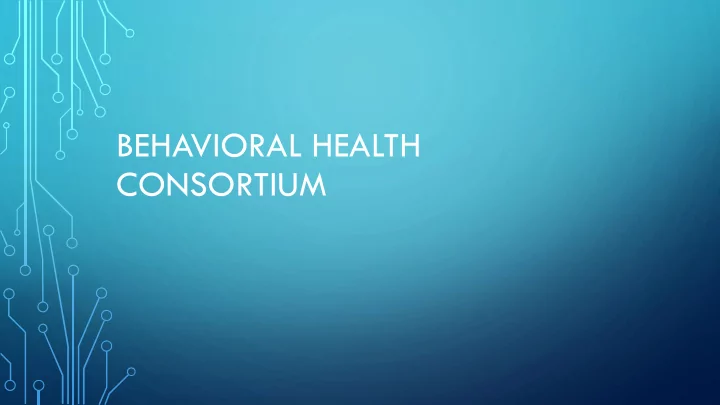

BEHAVIORAL HEALTH CONSORTIUM
INTRODUCTION
BEHAVIORAL HEALTH IN DELAWARE • DELAWARE HAS ABOUT 30,000 ADULTS AND 9,000 CHILDREN SUFFERING FROM A SUBSTANCE USE DISORDER OR A MENTAL ILLNESS. • Total population of Delaware is about 945,000 • 1 IN 5 DELAWAREANS WILL SUFFER FROM SOME FORM OF A MENTAL ILLNESS IN ANY GIVEN YEAR. • 80% OF DELAWARE INMATES HAVE A MENTAL ILLNESS OR SUBSTANCE USE DISORDER. • This makes the prison system or largest treatment provider. • DELAWARE HAD 400 OVERDOSE FATALITIES IN 2018
BEHAVIORAL HEALTH IN DELAWARE OUTLINING THE PROBLEM MENTAL HEALTH TASKFORCE OF 2015 --CAUSES FOR HIGHER RATES OF ADDICTION AND MENTAL ILLNESS • STIGMA • COST • WORKFORCE • LACK OF ACCESS TO TREATMENT/TRANSPORTATION • SERVICE DELIVERY/HANDOFF GAPS • LACK OF EARLY INTERVENTION
WHAT WE HAVE DONE TO SAVE LIVES: • NALOXONE- COMMUNITY/LAW ENFORCEMENT • PRESCRIPTION DRUG MONITORING PROGRAM (PMP) • OVERDOSE FATALITY REVIEW COMMISSION • 911 GOOD SAMARITAN ACT • BROCK’S LAW – FENTANYL CHARGE • HOSPITAL’S AND TREATMENT CLINICS IN UNDERSERVED AREAS • ADDICTION ACTION COMMITTEE • BEHAVIORAL HEALTH CONSORTIUM
THE CREATION OF THE BEHAVIORAL HEALTH CONSORTIUM • SENATE BILL 111 W/ SENATE AMENDMENT 1- ESTABLISHES THE BEHAVIORAL HEALTH CONSORTIUM. COMPANION BILL “ADDICTION ACTION “ COMMITTEE (FO CUS ON PRESCRIPTIONS) REPORTS TO THE BHC • THE BILL ESTABLISHES AN OVERSIGHT BODY THAT WILL COORDINATE THE STATE’S PRIVATE AND PUBLIC BODIES TO REDUCE CURRENT SILOS, ESTABLISH GREATER ACCESS TO CARE, AND COMBAT ADDICTION AND IMPROVE MENTAL HEALTH SERVICES. • THE CONSORTIUM CALLS FROM GRASSROOTS ADVOCACY GROUPS, NON-FOR-PROFITS, PROVIDERS, HEALTH SYSTEMS, FIRST RESPONDERS AND COMMUNITY MEMBERS TO COLLABORATE TO TACKLE THE PRESSING ISSUES IN THE FIRST STATE. • THE CONSORTIUM IS MODELED AFTER THE DELAWARE CANCER CONSORTIUM.
ACTION STEPS • DELAWARE HAS CREATED A FORUM THAT BRINGS DIVERSE STAKEHOLDERS TOGETHER TO FORMULATE A STRONG PATH FORWARD • Real conversations, with people who have directly been impacted helps formulate a road map to combating the critical issues • THE WORK OF THE OVERDOSE FATALITY REVIEW COMMISSION HAS SPOTLIGHT CRITICAL AREAS OF NEED • Targeting high impact areas and properly dispatching resources to these areas, all while working with providers and first responders, will save lives • PROVIDING GREATER ACCESS TO CARE TRANSFORMS THOSE IMPACTED • Early intervention, coordinated treatment from health providers, and increased programs will directly impact population health outcomes
INITIAL - 3 YEAR ACTION PLAN CREATION OF SIX COMMITTEES: 1) ACCESS & TREATMENT 2) CHANGING PERCEPTIONS & STIGMA 3) CORRECTIONS & LAW ENFORCEMENT 4) DATA & POLICY 5) EDUCATION & PREVENTION 6) FAMILY & COMMUNITY READINESS
ACCESS AND TREATMENT Ensuring adequate resources, capacity and high- quality treatment should be a top priority for every behavioral health system across the State. Looking to expand treatment resources, which increase access for individuals is critical.
CHANGING PERCEPTIONS AND STIGMA The barrier that stigma presents is one of the most challenging obstacles for an individual in recovery. This was regularly communicated in both the Behavioral Health Consortium’s regular meetings and throughout the statewide community forums. The below recommendations are set forth to combat that stigma and work toward changing perceptions.
CORRECTIONS AND LAW ENFORCEMENT Our correctional, law enforcement and first responders are often the first contact for individuals who are struggling with a behavioral health crisis. The old school “tough on crime” mindset and initiatives of the 1900’s, where harsh sentencing and imprisonment was believe to fix crime, has systematically failed. For example, 82% of the State’s current inmate population have a serious mental illness and an underlying substance use disorder, which require treatment services. Currently, the Department of Correction is the largest behavioral health provider within the State.
DATA & POLICY The Data and Policy Committee looks to oversee any legislative action, collect critical data and ensure all other committees are receiving any data requested.
EDUCATION AND PREVENTION Providing education, prevention and early intervention is critical to ensure both mental and behavioral health issues are understood and addressed accordingly.
FAMILY AND COMMUNITY READINESS Our families and communities play a critical role in supporting, educating and fighting stigma for individuals who have a behavioral and mental health issue. Family and Community Readiness is what our families and communities need to better serve those experiencing an issue.
LEGISLATIVE ACHIEVEMENT'S SO FAR 5) Advocated and Received $5 million from 1) Overdose System of Care the Governor’s Budget 1) 1 st in the Nation 1) DHIN and addressing Year 1 Recommendations 2) Mental Health Parity 1) Ensuring Equity 6) Center of Excellence 1) Improving Treatment 3) Alternative Pain Management 1) DMMA/HighMark- low back 7) PMP Improvement pain 1) Perception monitoring enhancement 4) DSAMH Start Initiative 8) Psych Compact 1) Increase Access to Care and 1) Increasing access to care Treatment 9) Patient Brokering 1) Preventing fraudulent insurance claims
EMERGING PRIORITIES • Harm Reduction Measures • Narcan/Fentanyl Strips • Expansion of Medication Assisted Recovery • Correctional Setting • Statewide Community Health Worker Network • Youth Treatment & Education Assessment • Expansion of Law Enforcement Diversion Program • Parity within Insurances • Increase SUD treatment system
QUESTIONS AND CONTACTS Sydney Garlick, MSW, MPH Behavioral Health Coordinator 302-744-4243 Sydney.Garlick@Delaware.gov
Recommend
More recommend